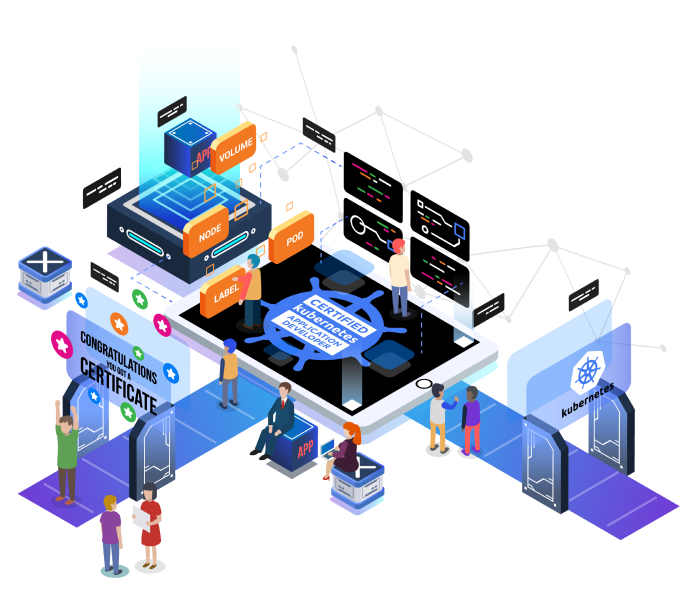Kubernetes Application Management
The course provides a comprehensive and detailed overview of Kubernetes, enabling students to work effectively with this powerful container orchestration platform. Various topics will be covered, including secure management of container image credentials using Image Pull Secrets, deployment templates for pods with scalability and load balancing patterns, as well as container restart policies and error handling.
The concepts of Jobs and CronJobs for planning ad hoc or scheduled tasks will be presented. In addition, the BlueGreen and Canary deployment approaches for introducing new versions of applications in a safe and controlled manner will be illustrated. Security will have a special focus, with a section on SecurityContexts for applying security policies to pods and containers.
Students will gain skills in managing the Kubernetes cluster via the command line and using APIs to manage cluster resources. The course will also present advanced concepts such as Custom Resource Definitions to extend Kubernetes resources to fit specific application needs. In addition, the concepts of ephemeral containers, which can be used for debugging and rapid pod maintenance, will be introduced.
COD: DSK202
Category : Kubernetes
Teaching methodology
The course includes educational laboratories in which each student will be able to work in order to complete training exercises that will provide practical experience in using the tool, for each of the topics covered during the course.
Prerequisites
- To have a complete knowledge of DSK101, DSK102 and DSK200 courses, or have equivalent knowledge.
- Basic knowledge of containerization concepts: It is helpful to have a general understanding of what containers are and how they are used to isolate and deploy applications.
- Familiarity with basic Kubernetes concepts: It is advisable to have a basic understanding of how Kubernetes works, e.g., cluster structure, pod, service and replication concepts, as well as resource management.
- Experience with the command line: It is important to be familiar with the use of the command line to interact with the operating system and administration tools, as most interactions with the Kubernetes cluster will be through a shell.
- Knowledge of networking concepts: It is helpful to understand the basics of networking concepts such as IP addressing, ports and protocols, as Kubernetes involves networking to enable communication between components.
- Basic knowledge of operating systems and system administration: It is advisable to have a general knowledge of operating systems and basic system administration operations, such as process and service management.
At the end of the course the participants will be able to:
- Understand and manage container image credentials using Image Pull Secrets.
- Explore pod design patterns and apply strategies for load balancing, scalability, and reliability.
- Understand container restart policies and apply best practices for error and outage management.
- Plan and execute ad hoc or scheduled jobs using Kubernetes Jobs and CronJobs concepts.
- Apply release strategies such as BlueGreen Deployment and Canary Deployment to release new versions of applications in a safe and controlled manner.
- Use security contexts (Security Contexts) to apply security policies to pods and containers.
- Interact with Kubernetes via the command line and use Kubernetes APIs to manage cluster resources.
- Extend the Kubernetes object model using Custom Resource Definitions to meet specific application requirements.
- Understand the use of temporary containers (ephemeral containers) for debugging and rapid pod maintenance.
Educational program
- Image Pull Secrets
- Pods Patterns
- Restart Policies
- Jobs & CronJobs
- BlueGreen Deployment
- Canary Deployment
- Security Contexts
- Interacting with Kubernetes
- Kubernetes APIs
- Custom Resource Defintions
- Ephemeral Containers
Duration – 1 day
Delivery – in Classroom, On Site, Remote
PC and SW requirements:
- Internet connection
- Web browser, Google Chrome
- Zoom
Language
- Instructor: English
- Workshops: English
- Slides: English
The price of this one-day course is €800+ VAT.











